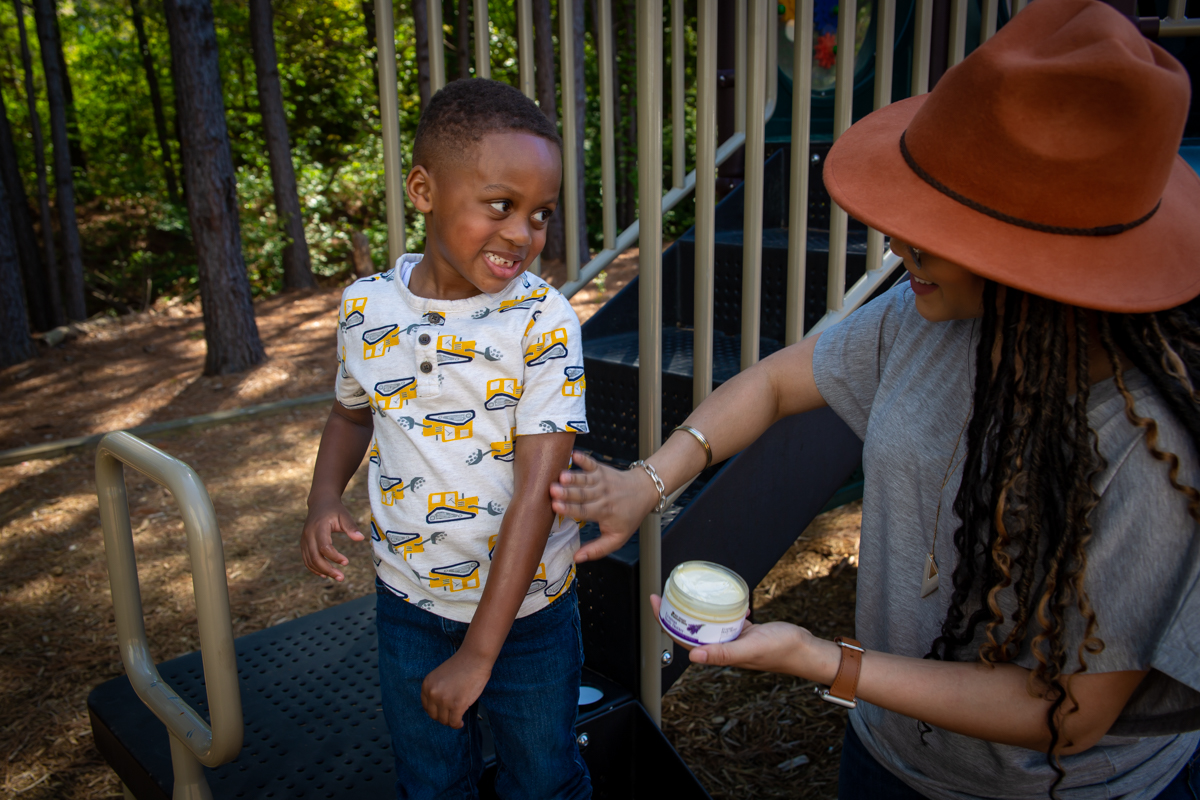
Discovering the best treatment options for your child can be overwhelming, emotional, and costly. My husband and I have spent countless hours researching and experimenting with several treatment options to manage our son’s eczema. During this process of trial and error…and I mean error, we discovered a few tips that work best when managing brown skin with eczema. Before we discuss treatment options, let’s tackle the basics.
While there is no cure for eczema, the key to managing eczema is keeping the symptoms under control. Below are a few helpful tips that I have learned along the way:
- Learn your child’s triggers and avoid them as much as possible (e.g., overheating, tight fitting clothing, itchy fabrics, food allergies. etc.)
- Use fragrance free products and washing detergent
- Moisturize immediately after bathing (within three minutes is a good rule of thumb)
- Research different over the counter (OTC) products to find out what works best for your child and incorporate them into your daily routine.
- Work with your pediatrician and/or dermatologist to determine what prescriptions are best suited for your child’s eczema needs and the frequency of usage. Depending on the severity of your child’s eczema, your child may not require prescription medicine or it can just be used as an “emergency” medicine for intense flare-ups.
- Monitor your child for signs of an infection. Intense scratching can cause the skin to break and lead to infection. Signs of infection include pus-filled bumps, pain, redness, fever, and irritation.
- Mostly importantly, try to remain calm during a breakout and remember that you are doing the best you can! Sometimes even when we do all the right things to keep our child’s eczema under control, they still have flare ups. Eczema is an unpredictable disease and we are consistently learning every day. Let’s talk treatment options.
There are several treatment options for managing your child’s eczema, including OTC drug store and organic products, daily care routines, and prescription drugs. Remember that every child’s eczema symptoms are different and everyone doesn’t respond the same way. I recommend working with your team of medical professionals to find a treatment(s) that works best for your child. I personally use a combination of the treatment options below to manage my child’s eczema, but I limit my use of prescription drugs as much as possible.
- Proper Bathing Techniques. WATER WATER WATER! Water is the key to moisturizing your child’s skin. How many natural hair moms out there understand the value of water! The same thing applies to our babies. The most effective way to treat dry skin is to give it the moisture it needs through bathing and proper moisturizing techniques. When bathing your child, make sure the water is lukewarm; water that is too hot will actually do the reverse and cause the skin to dry out. My pediatrician also informed me that timing is also critical when bathing. Try to either keep the baths under five mins (before the pores open) or over 10 mins (when the pores open). And of course moisturize immediately after bathing, preferably within three minutes to allow the moisture to sink in.
- Moisturizing the Skin. Moisturizing the skin is critical to preventing a breakout. Leaving the skin too dry can initiate a flare-up, as it causes the skin to become irritated and itchy. The reason being is that children with eczema have dryer than normal skin and lack the outer skin barrier protecting them from irritants and allergens penetrating their skin. This is why in cold winter months, eczema tends to reek havoc on our children. It is important to maintain a healthy moisturizing routine to ensure your child’s skin is protected from environmental elements and to prevent dry cracked skin that can lead to a flare. Also keep in mind that dry and cracked patches on the skin is more apparent in our brown children. I typically moisturize my child with a cream, two to three times a day to keep his skin moisturized and minimize flares. Tip – Coconut oil immediately after a bath is a great sealant for children of brown skin.
- OTC and Organic Products. Over the counter (OTC) and organic products is typically what I use to manage my child’s eczema. These are products that you can purchase at a local drug store or online to incorporate in your daily routines. These products also do not require a prescription from your doctor. I have a tried a myriad of products and let me tell you…not all are created equal! Some are used to moisturize, serve as barriers, and relieve symptoms, while others focus on calming the skin during a flare up. The products that I have found that works the best are those that focus on moisturizing the skin, but do not block your pores (i.e., creams rather than lotions).
- Health Eating Habits. I truly believe that maintaining a healthy gut is the key to treating your child’s body internally to minimize the body’s external reaction to an allergen. Children who have eczema have a higher risk of developing a food allergy or some form of allergies. There are certain foods allergies that are closely associated with eczema that trigger an outbreak, such as cow’s milk, eggs, soy products, gluten, fish, and nuts. While your child may not have sensitivity to these foods, the important thing to remember is to introduce healthy foods in your child’s diet and knowing what foods trigger a flare.
- Prescriptions. Depending on the severity of your child’s eczema your pediatrician or dermatologist may prescribe medication to treat eczema symptoms. Topical prescription drugs such as corticosteroids are typically used to treat eczema breakouts over a period of time to treat the external and internal layers of the skin. I recommend working with your medical professionals to discuss any concerns you may have with topical prescription usage and develop a plan best suited for your child. I personally limit usage of any prescription drugs on my son’s skin to “emergency” flare-ups only. Keep in mind that with brown skin, there are adverse affects that come along with ongoing usage of topical steroids, such as skin discoloration. My husband and I experienced this first hand earlier on with my son, as he has dark and light patches on his skin from steroid usage when he was first diagnosed with eczema.
